初中英语教师帮扶计划
初中英语师带徒帮扶计划
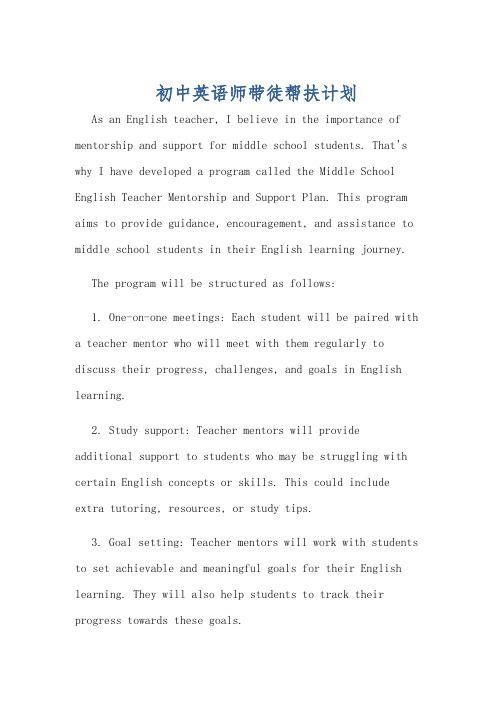
初中英语师带徒帮扶计划As an English teacher, I believe in the importance of mentorship and support for middle school students. That's why I have developed a program called the Middle School English Teacher Mentorship and Support Plan. This program aims to provide guidance, encouragement, and assistance to middle school students in their English learning journey.The program will be structured as follows:1. One-on-one meetings: Each student will be paired witha teacher mentor who will meet with them regularly to discuss their progress, challenges, and goals in English learning.2. Study support: Teacher mentors will provideadditional support to students who may be struggling with certain English concepts or skills. This could include extra tutoring, resources, or study tips.3. Goal setting: Teacher mentors will work with students to set achievable and meaningful goals for their English learning. They will also help students to track their progress towards these goals.4. Feedback and encouragement: Teacher mentors will provide constructive feedback on students' English assignments and work, as well as offering words of encouragement and support.5. Resources and opportunities: Teacher mentors willalso provide students with resources and opportunities to further their English learning, such as recommending books, websites, or extracurricular activities.The ultimate goal of the Middle School English Teacher Mentorship and Support Plan is to empower students to become confident and proficient English learners. By providing personalized support and guidance, we aim to help students develop a love for the English language and the skills they need to succeed in their academic and personal lives.作为一名英语老师,我相信对初中生进行导师制和支持至关重要。
英语教师帮扶工作计划表

英语教师帮扶工作计划表
1. 了解学生情况
- 通过学生自我介绍、问卷调查等方式了解学生的基本情况和学习习惯
- 与班主任、家长沟通,了解学生的家庭背景和学习情况
2. 制定个性化学习计划
- 根据学生的基本情况和学习需求,制定个性化的学习计划- 与学生进行面对面沟通,讨论学习目标和方法,制定可行的学习计划
3. 辅导学生课外学习
- 组织课外学习小组,进行学习技巧和方法的指导
- 提供学习资源和辅导,帮助学生解决学习中遇到的问题
4. 鼓励学生参加英语活动
- 推荐学生参加英语角、辩论赛、英语报告等活动,提高语言实践能力
- 组织英语俱乐部或读书会,增强学生对英语学习的兴趣和热情
5. 定期跟踪学生学习情况
- 定期与学生进行学习情况的跟踪,及时发现问题并进行调整- 与班主任、家长进行沟通,共同关注学生的学习进展和问题解决
6. 总结帮扶工作经验
- 定期对帮扶工作进行总结,发现问题并改进工作方法
- 与其他英语教师交流工作经验,共同提高帮扶工作的质量和效果。
初三英语培优助困计划
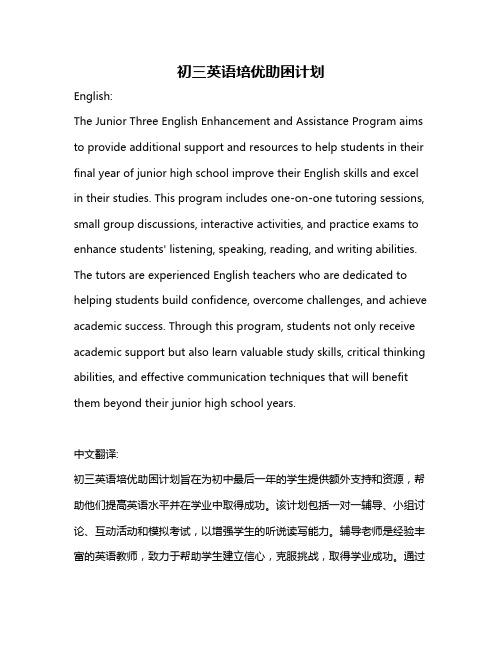
初三英语培优助困计划English:The Junior Three English Enhancement and Assistance Program aims to provide additional support and resources to help students in their final year of junior high school improve their English skills and excel in their studies. This program includes one-on-one tutoring sessions, small group discussions, interactive activities, and practice exams to enhance students' listening, speaking, reading, and writing abilities. The tutors are experienced English teachers who are dedicated to helping students build confidence, overcome challenges, and achieve academic success. Through this program, students not only receive academic support but also learn valuable study skills, critical thinking abilities, and effective communication techniques that will benefit them beyond their junior high school years.中文翻译:初三英语培优助困计划旨在为初中最后一年的学生提供额外支持和资源,帮助他们提高英语水平并在学业中取得成功。
八年级英语辅导计划(三篇)
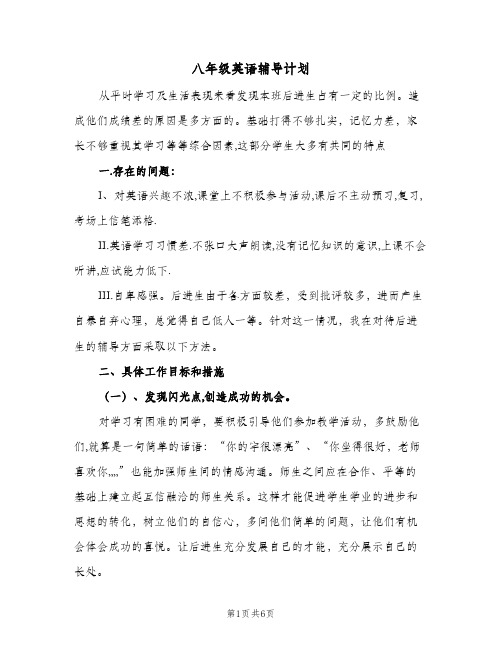
八年级英语辅导计划从平时学习及生活表现来看发现本班后进生占有一定的比例。
造成他们成绩差的原因是多方面的。
基础打得不够扎实,记忆力差,家长不够重视其学习等等综合因素,这部分学生大多有共同的特点一.存在的问题:I、对英语兴趣不浓,课堂上不积极参与活动,课后不主动预习,复习,考场上信笔添格.II.英语学习习惯差.不张口大声朗读,没有记忆知识的意识,上课不会听讲,应试能力低下.III.自卑感强。
后进生由于各方面较差,受到批评较多,进而产生自暴自弃心理,总觉得自己低人一等。
针对这一情况,我在对待后进生的辅导方面采取以下方法。
二、具体工作目标和措施(一)、发现闪光点,创造成功的机会。
对学习有困难的同学,要积极引导他们参加教学活动,多鼓励他们,就算是一句简单的话语:“你的字很漂亮”、“你坐得很好,老师喜欢你……”也能加强师生间的情感沟通。
师生之间应在合作、平等的基础上建立起互信融洽的师生关系。
这样才能促进学生学业的进步和思想的转化,树立他们的自信心,多问他们简单的问题,让他们有机会体会成功的喜悦。
让后进生充分发展自己的才能,充分展示自己的长处。
(二)、用爱心去温暖,用耐心去呵护多花一些时间了解后进生,理解他们,尊重爱护他们。
在课堂上优先对待他们,不要总把目光停留于优等生。
要心里时刻装着后进生,时刻为他们着想。
(三)、教给方法,提高兴趣后进生普遍存在基础不扎实的情况。
从简单的、他们有能力接受的方法去做。
例如:定时到老师处进行信息反馈,检查复习效果,及时在班里表扬鼓励。
亦可求助于成绩好的同学或老师。
在学习的过程中提高他们的学习兴趣。
帮老师做做小事、抄抄写写。
叫他们做,亦即从侧面说明老师重视他们,看得起他们,没有遗弃他们。
他们的心里总会有小小感激。
在谈心、交往的过程中,要把学生学习的兴趣吸引过来,可进行有关学习的交谈,用行动去证明你作为老师的是从心里面想他们学好。
(四)、结对帮助,齐抓共管充分发挥家长学校的管理作用,与家长多联系齐抓共管,促其进步。
英语教师培优帮困工作计划

英语教师培优帮困工作计划
为了提高英语教育质量,我们制定了以下工作计划:
1. 针对教师的培优工作:
- 开展定期的教师培训活动,提高教师英语教学水平。
- 组织教师参加专业英语培训课程,提高他们的语言能力和教学技能。
- 鼓励教师参加国际英语教育交流活动,拓宽他们的视野和教学思路。
2. 针对学生的帮困工作:
- 设立学习辅导小组,帮助学习困难的学生提高英语成绩。
- 开展英语学习营,提供专业的教学辅导和学习指导。
- 开设英语学习资源中心,提供学习资料和学习工具,让学生能够自主学习和提高英语能力。
3. 针对教学环境的改善工作:
- 完善英语教学设施和设备,提供更好的教学环境和条件。
- 建立英语教学风气,营造积极的学习氛围,激发学生学习的兴趣和动力。
- 加强与家长的沟通和合作,共同关注学生的学习情况,共同努力提高英语教育质量。
八年级英语结对帮扶计划

八年级英语结对帮扶计划英语是中学最主要的课程之一。
尽管英语教学在农村中学已普遍得到重视,然而,学生的英语成绩“两极分化”现象却越来越严重。
很多学生在初中学英语不到一年时间,就成为学习英语困难的学生——学困生。
“学困生”是指班级中由于教师或家庭及自身等多方面的原因,造成学习成绩差或学力差的学生群体。
表现为缺乏自信、学习被动、态度不端正、方法欠妥,对完成学习任务有一定困难。
这样的学生数量随着年级递增、课程内容增加、难度加大而增加,使英语教学越来越困难。
这一现象,一直困扰着农村英语教师。
如何转化“学困生”成为大家共同探讨的热点问题。
因此,认真分析、找出原因、寻求对策,显得尤为重要。
一、农村中学英语“学困生”形成的原因造成“学困生”的原因有多方面,有智力因素,但更多的是非智力因素,主要有以下几方面:1.社会及家庭对学生的影响家庭是教育的重要组成部分,由于不少农村学生家庭比较贫困,对学生学习英语必备的学习用具(如复读机或录音机等)不能满足;父母文化水平较低,对学生的学习关心不够;不能给孩子提供良好的学习环境等。
另外,部分地区的学校周边环境较为混乱;社会上流行的“读书无用”论,以及商品经济的大潮也不断地冲击学校,对学生的思想造成很大的负面影响,致使学生的学习积极性降低。
2.学生自身的因素(1)学力基础差。
学力主要指必备的学习基础知识和综合学习能力,包括理解、记忆、思维等能力。
由于农村初中生大部分来自于师资、教学条件相对薄弱的乡村小学,在英语启蒙阶段没有得到良好的教育,造成学力基础不扎实。
(2)没有良好的学习习惯和学习方法。
部分学生在课前不预习、上课注意力不集中、课后不巩固和消化,消极被动。
(3)不良的个性特点和个性倾向。
如意志力薄弱、兴趣广泛而不专一,注意力稳定性差。
在学习中常碰到困难、遭遇失败而丧失了学习的信心。
3.教师的因素从客观上讲,农村初中的英语师资水平整体上不够高。
(1)教师的责任心和情感因素:部分教师只钟爱、赏识英语基础好的学生,而对基础差的学生漠不关心,他们由于得不到老师关爱失去信心,成绩越来越跟不上。
初中英语培优促中补差计划

初中英语培优促中补差计划一、指导思想为不断提升学生英语素养,激发学生学习英语的兴趣与激情,促进学生语言的潜能发挥。
通过培优促中补差,让学生得到均衡发展,调动学生学习英语的积极性和成就感,进一步巩固并提高学生英语学习成绩。
二、具体目标1.训练学困生英语学习习惯,提高学困生的英语学科自主和自觉学习能力,让学困生“吃得了”。
2.培养中等生的英语能力,让中等生“吃饱”。
3.挖掘优生的英语潜能,让优生“吃好”。
4.形成较为扎实的英语基础和阅读能力。
5.提高听、读、说、写的综合英语能力。
6.提高学生的英语成绩。
三、学生情况分析1.学困生情况分析:目前,班级英语学困生有12人。
主要有以下情况:(1)学习习惯较差:有的学生不做英语作业,有的作业不能及时完成,作业书写潦草,上课不认真听讲。
(2)缺乏学习兴趣:没有学习英语的方法,学习态度消极。
(3)基础薄弱:对英语基础知识基本没有掌握,导致英语学习越来越困难,2.中等生情况分析:目前。
班级英语中等生有28人。
主要有以下情况:(1)学习积极性一般:学习英语都在教师督促下多,在家长催促下多。
(2)学习习惯一般:作业有时不能及时完成,字迹有点潦草。
(3)进取心不足:没有进取意识,满足现状的多,刻苦钻研不够。
3.优生情况分析:目前。
班级英语中等生有12人。
主要有以下情况:(1)学习积极性高:学习目的明确,学习英语兴趣浓,学习积极性很高。
(2)学习习惯好:英语学习习惯很好,上课认真,作业能按时按量完成,且质量较好。
(3)基本能力较强:基本掌握了一定英语学科的学习方法和学习技巧。
(4)存在问题:学习英语潜能还需要进一步激发,听力训练要进一步加强,阅读与写作能力还有待于提高。
四、具体措施(一)全面落实培优措施(优生)1.强化思想教育,立足“两个培养”(1)加强思想教育,培养戒骄戒躁的学习品质。
(2)加强思想教育,培养不断进取意识。
2.落实学习措施,做到“三个强化”(1)进一步强化英语基础知识学习,多温习,多背、多听、多读、多练。
英语老师帮扶工作计划(优选4篇)

英语老师帮扶工作计划(优选4篇)英语老师帮扶工作计划篇1为了学生能取得令人满意的成绩,制订了下半年英语教学计划。
一、工作目标(一)进一步加强研究1.结合新课标,以《初中英语课程标准》中的具体教学建议作为复习的依据。
认真研究《考试说明》的变化,探索命题原则,内容和特点,明确复习教学要求。
2.研究中考试题,把握考试趋势。
要把近些年的中考题重新做一遍,并进行深入细致的研究,做到每年考什么心中有数。
3.多渠道搜集最新的中考信息及训练材料研究中考信息和考试动向。
及时了解中考动态,适时调整复习方案。
(二)进一步夯实基础1.重视词汇的复习教学。
注意新增词汇识记和运用。
重视语法的复习教学。
帮助学生对语法进行有效的总结、归纳和梳理。
2.在复习过程中,深入了解学情,分析学情,尤其要了解英语为弱科的边缘生,选择恰当的教法,进行学法指导。
少讲多练,精讲精练,力争做到习题讲评过程中“三讲三不讲”,即讲清重点,难点,疑点;学生会的不讲,学生能自己解决的不讲,估计讲了也不能理解的则不讲。
3.严格限时练习制度,加强批阅、检查。
争取每天有固定的时间来进行限时训练,培养紧张思维,平均时间30分钟,主要是完型填空、阅读理解和任务型阅读。
听力每周也有三次固定的训练时间。
写作也基本做到每周1篇,采用“讲——练——讲”的方法并认真批阅。
平时我们要做到测试习题有发必收,有收必改,根据批阅所了解的情况,分析错因,找准试题的切入点,透彻讲解,制定补救措施,以起到举一反三的作用,提高课堂效率。
(三)进一步培养应试能力1.加强对语篇阅读理解能力的训练,要求学生每天坚持做两篇阅读理解,中考试题中,语篇考查所占比重极大,除单选题之外全是语篇。
因此复习中要增强语篇意识。
守住“阅读”,促进综合能力提升。
在整个复习过程中始终把“阅读”能力放在重要的位置,有目的地筛选阅读材料。
精选阅读语篇中的长句教会学生如何理解长句,提高学生的解析能力。
2.加强书面表达能力的训练与培养,每周至少写一篇作文,提高写作能力。
初中英语培优扶弱计划1

初中英语培优扶弱计划一、学生情况分析1.优等生情况:他们通常学习习惯良好,能认真听讲,思维活跃,善于发现问题并解决问题,对知识的应用能力较强。
在课堂表现上,他们积极发言,课后及时复习,已掌握初步的英语学习方法和技巧。
2.弱项生情况:他们可能在英语学习上存在困难,如词汇量不足、语法掌握不牢固、口语表达能力差等。
在学习态度上,他们可能缺乏自信,对英语学习产生抵触情绪。
二、培优措施1.拓展知识面:为优等生提供丰富的阅读材料,如英文原著、英文报刊等,帮助他们扩大词汇量,提高阅读理解能力。
2.加强听说训练:组织英语角、英语演讲比赛等活动,为优等生提供锻炼口语表达能力的机会,同时培养他们的自信心。
3.个性化辅导:针对优等生的特长和兴趣,提供个性化的辅导,如写作指导、阅读指导等,帮助他们更好地发挥自己的优势。
三、扶弱措施1.基础知识巩固:针对弱项生的实际情况,制定针对性的教学计划,帮助他们巩固基础知识,如词汇、语法等。
2.激发学习兴趣:通过丰富多样的教学活动,如游戏、歌曲、电影等,激发弱项生对英语学习的兴趣,提高他们的学习积极性。
3.耐心辅导:对弱项生进行耐心辅导,鼓励他们多提问、多思考,帮助他们逐步克服学习困难。
4.家校合作:与家长保持密切联系,共同关注弱项生的学习情况,共同制定帮扶计划,为弱项生提供全方位的支持。
四、实施策略1.制定详细计划:根据学生情况分析,制定详细的培优扶弱计划,明确目标、内容、方法和时间节点。
2.落实责任:明确教师和学生的责任,确保计划的顺利实施。
教师要做好备课、授课、辅导等工作,学生要积极参与学习、认真完成作业、主动提问等。
3.监督评估:定期对计划的实施情况进行监督评估,发现问题及时调整改进。
同时,通过考试、测试等方式检验学生的学习成果,为下一步的教学提供指导。
4.持续改进:根据评估结果和学生反馈,不断完善和优化培优扶弱计划,提高教学质量和效果。
通过以上措施的实施,我们可以为初中英语优等生提供更多的拓展机会和挑战,帮助他们更好地发挥自己的潜力;同时,为弱项生提供有针对性的支持和帮助,激发他们的学习兴趣和自信心,提高他们的英语成绩。
初中英语教师的青年教师指导帮扶计划
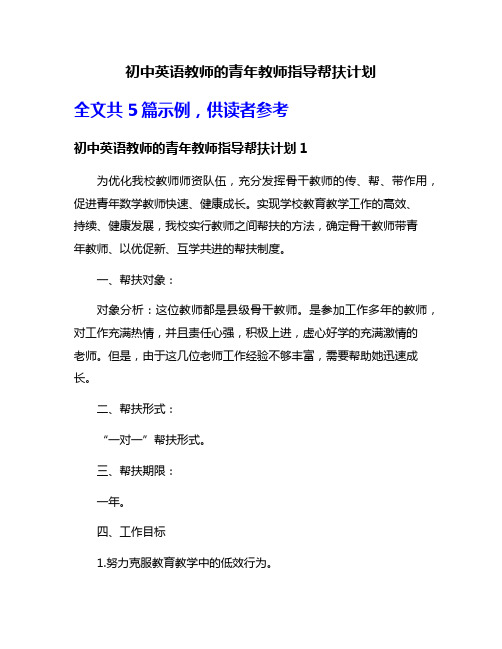
初中英语教师的青年教师指导帮扶计划全文共5篇示例,供读者参考初中英语教师的青年教师指导帮扶计划1为优化我校教师师资队伍,充分发挥骨干教师的传、帮、带作用,促进青年数学教师快速、健康成长。
实现学校教育教学工作的高效、持续、健康发展,我校实行教师之间帮扶的方法,确定骨干教师带青年教师、以优促新、互学共进的帮扶制度。
一、帮扶对象:对象分析:这位教师都是县级骨干教师。
是参加工作多年的教师,对工作充满热情,并且责任心强,积极上进,虚心好学的充满激情的老师。
但是,由于这几位老师工作经验不够丰富,需要帮助她迅速成长。
二、帮扶形式:“一对一”帮扶形式。
三、帮扶期限:一年。
四、工作目标1.努力克服教育教学中的低效行为。
2快速提高自身的教育技能和教育综合能力。
3.在同伴互助、专业引领、自我反思的实践共同成长。
五、一年发展目标:在一年的帮扶中,我希望能达到以下的总体目标:让这位教师在学科专业知识有较大的提升,结合她从教总结成功经验,能把教学课堂“活”起来;教学教研能力得到一定的提升;通过一年的努力,形成自己独特的教学风格,上一节示范课。
市级以上的刊物发表论文。
1.与这位教师进行备课,尽快熟悉教材的编写意图,既要备教材,又要备学生,做到上课胸有成竹,心中有数,及时对教学进行反思。
2.每学期上一节校内公开课。
3.着重提高课堂教学效率,培养学生良好的学习习惯和方法,能很好的驾驭课堂,让课堂“活”起来,形成个人独特的教学风格。
4.学习有关理论书籍,提高教学理论水平。
5.发表一篇区级以上论文、案例或教学设计。
六、帮扶措施:1.积极参加各种教研活动,及时做好笔记,写好心得。
2.坚持每周与教师进行交流,了解其教学动态,及时排忧解难,解决教学困惑。
3.听课:我和这位老师建立一个不定期的互相听课的制度。
他随时到我的课堂听课,了解我对教材的处理和对课堂教学的组织;我也会随堂听这位老师的课了解其最真实的课堂行为,发觉其课堂教学的优劣所在。
七年级英语培优帮扶计划表

七年级英语培优帮扶计划表
前言
英语是国际间最主要的交流工具之一。
在现实生活中,掌握英语已经成为进入社会的必备技能之一。
而初中阶段则是英语学习的一个重要时期,为了更好地帮助学生学好英语,在七年级英语教学中,我们开展了“培优帮扶计划”。
1. 计划目标
本计划的目标是帮助学生提高英语听、说、读、写四方面技能,全面提升学生英语综合素养。
2. 具体措施
2.1 学习计划
每周根据教材内容和学生掌握情况布置课外阅读任务。
同时,定期进行听说读写训练,帮助学生提高英语技能。
2.2 个性化帮扶
对于英语成绩差的学生,我们会根据其掌握情况,制定个性化学习计划,一对一辅导,确保每个学生都能够取得进步。
2.3 英语角活动
定期组织丰富多彩的英语角活动,加强学生的英语口语交流能力,提高学生对英语的兴趣。
3. 评估方式
针对学生不同阶段的英语学习情况,我们将制定不同的测试和考试,监测学生的学习过程和成果,并通过一系列数据对学生的英语能力和学习效果进行评估和反馈。
4. 总结
本计划是一次有益的尝试,通过培优帮扶计划,我们能够更好地帮助学生学好英语,提高学生的英语综合素养,同时也为他们将来的发展打下坚实的基础。
我们相信,只要我们坚持不懈,每个学生都会收获自己的进步和成长。
英语学困生帮扶计划及措施

英语学困生帮扶计划及措施本学期,我担任七年级英语教学工作,在我所教的年级中,有很多学生在学习上存有较大的困难,针对孩子的具体情况,我制定了以下的帮扶措施。
一、学困生形成的原因(一)缺乏学习动机,学习自觉性差随着英语学习的持续加深,词汇量增大,多数学生学习速度减慢,错误量增加,上英语课就像听天书,课前课后干脆听之任之,缺乏内在的学习动机。
初中学困生常感到学英语无聊,无兴趣,学习就像算盘珠一样,拨一拨,动一动。
不能在课堂上积极思维,不擅长活跃自己的智力活动。
(三)自主学习水平差、教法不当因为初中阶段不考语音,致使有些教师无视了语音教学;加之,忽略了很多本该有学生来做的很多教学行为。
天长日久,使很多学生没能形成自主学习水平,严重制约了他们对英语学习的积极性。
(四)缺乏科学的学习方法,学习效率低学困生往往靠死记硬背来记忆知识,朗读时有口无心,课内学、课后忘,知识的巩固率低。
在学习中懒惰心理强、依赖性强,缺乏独立思考水平,不用功、不求上进,遇到困难就打退堂鼓。
(五)缺乏语境、课外英语阅读少虽然新课程标准对初中学生的阅读量做出了5万到15万不等的具体要求。
课外,学生实行听说训练很少,课外英语阅读材料更是匮乏,这些都成了制约农村基础英语发展的瓶颈。
二、学困生的转化对策(一)培养学生良好的学习习惯首先,起始阶段把好音标关。
在七年级一定要不遗余力的让学生学好音标,并结合单词教学,让学生掌握发音规则。
这样,学生在词汇的学习上就先行一步。
其次,课堂中学会记笔记。
教师在上课的过程中,首先要求学生听懂知识,然后给他们时间来整理笔记,消化知识,提出疑惑。
再次,把好作业反馈关,杜绝抄袭现象。
只有这样,教师才真实地理解学生对知识的掌握情况。
(二)树立信心,培养学习英语的兴趣。
对于初学者来说,对英语有着强烈的好奇心,所以,教师要抓住这个点,树立学生学习的自信心,将会收到事半功倍的效果。
学习时,要鼓励每个学生学好英语,明确目的,产生强烈的求知欲,推动学生去努力学习,取得更大的进步。
初中英语学困生帮扶计划

初中英语学困生帮扶计划前言初中阶段是人生的转折点,也是从初学者到初级学习者的关键时期,但是在这段时间内,有很多学生在英语课程中遇到了困难,成为了英语学困生。
为了帮助这部分学生,学校可以制定出一份初中英语学困生帮扶计划,帮助学生尽早适应学习环境,提高英语学习能力。
方案1. 确定帮扶对象和标准学校可以通过一定的评估方式,对英语学科的水平进行评测,然后确认学习英语困难的学生为帮扶对象。
可以考虑以下几个方面:•英语成绩低于班级平均分•英语成绩连续下降•英语基础薄弱,无法达到基本的交流能力2. 制定帮扶方案在确定了帮扶对象后,通过对其进行英语课程和学习方面的综合分析,制定适合不同学生的帮助方案。
•向英语成绩中等的学生提供加强练习的课程•向英语成绩较低且基础不扎实的学生提供更为基础的课程•针对经常旷课、厌学的学生提供有针对性的辅导和帮助•着重对听、说、读、写四个方面进行补充训练•以小组辅导的方式,进行针对性和个性化的辅导和改进3. 收集教学资料根据学生的不同情况,可以收集教材、习题、历年考试试卷等资料,作为帮扶学生时的教学材料和练习题,供学生练习巩固。
4. 建设一些网上学习平台可以在学校网站上,建设一个针对学习困难学生的英语学习平台,在这里提供更多的学习资源和辅导课程,为学生提供良好的学习环境。
实施效果通过制定帮扶计划,可望得到以下几个方面的实施效果:•有助于提高学生的自信心和兴趣,增强学生学习英语的积极性•有助于让学生树立学习目标,制定英语学习计划,为英语学习生涯奠定良好基础•改善学困生学习状态,提高学习成绩,增加学习动力,为日后继续深入英语学习打好基础结论对于初中英语学困生,学校应该采取更为全面、系统的帮扶计划,而不是仅仅期望他们通过自己的努力提高成绩。
通过该计划的实施,学生能够得到更好的锻炼机会,增强自己的英语学习能力和信心。
相信,通过这些提高,学生的英语学习成绩和学习兴趣也会得到明显的改善。
【帮扶工作相关4篇】初中英语教师帮扶计划

文档为Word版,可以编辑修改,精选几篇仅供大家参考!目录1.初中英语教师帮扶计划2.小学体育教师工作计划例文3.高中教师个人工作计划例文4.20xx年春幼儿园教师个人计划初中英语教师帮扶计划我校的英语教研组主要由青年教师组成,且都是新教师,由于英语老师的严重缺乏,青年老师承担着繁重的教学任务。
因此,加快青年教师的培养工作显得尤为迫切和需要。
本学年英语教研组青年教师培养工作的目标是以老带新,使三年内工作的新教师,尽快熟悉教学业务,缩短磨合期,尽快胜任小学英语教学,成为英语组的中坚力量,并在教学和教研工作中尽快取得好成绩。
本学年主要从以下几个方面开展工作1、新老教师结队帮扶,组长既是本学科的领头人,同时又是青年教师的指导老师,定期的听青年教师的课,指出存在的不足,提出改进的方案,帮助其快速熟悉业务,胜任教学工作。
2 、强化备课的常规化和规范化,提高教学水平无论是老教师还是新教师都必须认真备课,而且都应有详细的教案。
对于青年教师,老教师将予以具体指导:如指导他写教案、命题、上课、开展课外活动等。
对于教学上的困难,则通过平时听课、帮助备课并指导他上好组内教学实践课的形式,使他不断提高自己的教学水平3、坚持听、课评课制度,加强青年教师业务素质的提高根据学校要求,青年教师每人每学期开设有特色的组内公开课一次。
开课前,组织教师一起讨论教案,听取试教,在试教基础上再修改教案,然后正式执教。
课后组织全组教师进行认真讲评。
讲评以发扬优点为主,同时也要实事求是地指出一些缺点,以求进一步提高。
听课评课的过程实际上就是教师业务进修的过程,而且这种形式的进修对青年教师来说更加实惠,更加有吸引力。
尽可能的给青年教师创造外出学习的机会,并且积极参加区教研室等开设的进修课程和培训课程4、加强理论学习,提高科研能力组织青年教师一起学习新课程标准,让他们尽可能的了解最新英语教改的动态,以最新的理论指导自己的教学,适应英语改革的方向。
初中英语教师结对帮扶计划
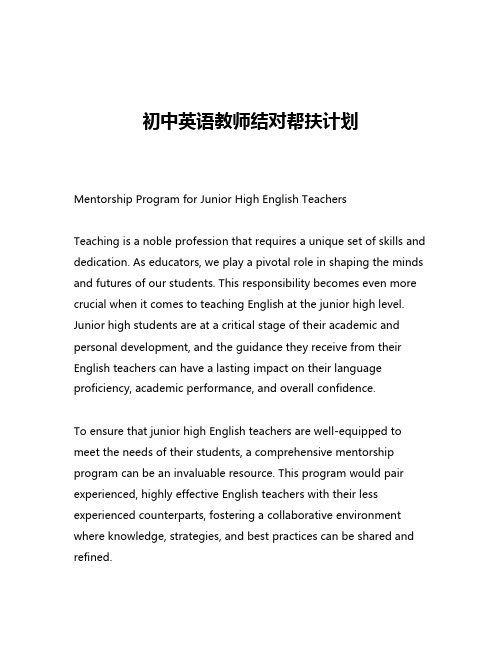
初中英语教师结对帮扶计划Mentorship Program for Junior High English TeachersTeaching is a noble profession that requires a unique set of skills and dedication. As educators, we play a pivotal role in shaping the minds and futures of our students. This responsibility becomes even more crucial when it comes to teaching English at the junior high level. Junior high students are at a critical stage of their academic and personal development, and the guidance they receive from their English teachers can have a lasting impact on their language proficiency, academic performance, and overall confidence.To ensure that junior high English teachers are well-equipped to meet the needs of their students, a comprehensive mentorship program can be an invaluable resource. This program would pair experienced, highly effective English teachers with their less experienced counterparts, fostering a collaborative environment where knowledge, strategies, and best practices can be shared and refined.The primary goal of this mentorship program would be to provide junior high English teachers with the support and guidance they need to become more effective educators. By pairing them with seasoned professionals, the program would offer a unique opportunity for professional development, allowing them to learn from the successes and challenges of their mentors.One of the key components of the mentorship program would be regular classroom observations. Mentors would visit their mentees' classrooms, observing their teaching methods, classroom management strategies, and student engagement. These observations would then be followed by detailed feedback and collaborative discussions, where the mentor and mentee could explore ways to improve lesson planning, delivery, and overall classroom effectiveness.In addition to classroom observations, the mentorship program would also include regular one-on-one meetings between the mentor and mentee. These meetings would provide a safe and supportive environment for the mentee to discuss any challenges they are facing, whether they are related to curriculum development, student behavior, or personal growth. The mentor would then offer guidance, suggestions, and practical strategies to help the mentee navigate these challenges and become a more confident and effective educator.Another important aspect of the mentorship program would be the opportunity for mentees to observe their mentors in action. By shadowing their mentors in the classroom, mentees would have the chance to witness firsthand the strategies and techniques that have made their mentors successful. This hands-on learning experience would be invaluable, as it would allow mentees to see how the theoretical concepts they have learned can be applied in a real-world setting.Furthermore, the mentorship program would encourage the development of collaborative relationships among junior high English teachers. By fostering a sense of community and camaraderie, the program would create a supportive network where teachers can share resources, exchange ideas, and learn from one another. This collaborative approach would not only benefit the individual teachers but would also have a positive impact on the overall quality of English education in junior high schools.One of the key benefits of the mentorship program would be the opportunity for mentees to receive personalized feedback and guidance. Each mentee would have unique strengths, weaknesses, and areas for improvement, and the mentor would work closely with them to develop a tailored professional development plan. This individualized approach would ensure that the mentee's specificneeds are addressed, helping them to become more effective and confident in the classroom.In addition to the direct benefits to the mentees, the mentorship program would also have a positive impact on the students they teach. By improving the skills and confidence of junior high English teachers, the program would ultimately lead to better learning outcomes for students. Students would receive more engaging and effective instruction, which would in turn improve their language proficiency, academic performance, and overall educational experience.Moreover, the mentorship program would have a ripple effect on the wider educational community. As junior high English teachers become more effective and confident, they would be better equipped to share their knowledge and expertise with their colleagues. This sharing of best practices would help to raise the overall standard of English education in junior high schools, benefiting students and teachers alike.To ensure the success of the mentorship program, it would be crucial to carefully select and train the mentors. These experienced English teachers would need to possess not only exceptional teaching skills but also strong interpersonal and communication abilities. They would need to be able to provide constructive feedback, offerpractical strategies, and create a supportive and collaborative environment for their mentees.Additionally, the mentorship program would need to be well-structured and well-resourced, with clear goals, expectations, and evaluation criteria. Regular program evaluations and feedback from both mentors and mentees would be essential to ensure that the program is meeting the needs of the participants and achieving its intended goals.In conclusion, the implementation of a mentorship program for junior high English teachers would be a valuable investment in the future of English education. By providing less experienced teachers with the support and guidance they need to become more effective educators, the program would not only benefit the teachers themselves but also the students they serve. Through this collaborative and personalized approach to professional development, we can work towards ensuring that every junior high student receives the high-quality English education they deserve.。
初中英语教师的青年教师指导帮扶计划

初中英语教师的青年教师指导帮扶计划全文共3篇示例,供读者参考篇1Young Teacher Guidance and Support Plan for Junior High School English TeachersIntroductionThe role of a mentor is fundamental in the growth and development of young teachers in any profession, and this is especially true in the field of education. In order to ensure the success and retention of young junior high school English teachers, it is essential to provide them with the necessary guidance and support. This document outlines a comprehensive plan for mentoring and assisting young teachers in their professional development.ObjectivesThe primary objectives of the Young Teacher Guidance and Support Plan for Junior High School English Teachers are as follows:1. To provide young teachers with the necessary support and guidance to help them navigate the challenges of their first few years in the profession.2. To foster a sense of community and collaboration among young teachers and experienced educators.3. To enhance the professional growth and development of young teachers through targeted mentorship and coaching.4. To create a culture of continuous learning and improvement within the school environment.Program ComponentsThe Young Teacher Guidance and Support Plan consists of the following key components:1. Mentorship Program: Each young teacher will be paired with an experienced English teacher who will serve as their mentor. Mentors will meet regularly with their mentees to provide guidance, support, and feedback on their teaching practices. Mentors will also help young teachers set professional goals and develop a plan for achieving them.2. Professional Development Workshops: The school will offer regular professional development workshops for young teachers focused on topics such as classroom management,lesson planning, assessment strategies, and student engagement. These workshops will provide young teachers with the opportunity to build their skills and expertise in key areas of teaching and learning.3. Peer Observations and Feedback: Young teachers will have the opportunity to observe their peers teaching in order to learn from their practices and gain new ideas for their own classrooms. Feedback sessions will be conducted following observations to provide young teachers with constructive feedback and suggestions for improvement.4. Reflective Practice: Young teachers will be encouraged to engage in reflective practice by regularly reflecting on their teaching experiences, identifying areas for growth, and setting goals for improvement. Mentors will support young teachers in this process and help them develop a habit of self-reflection.5. Community Building Activities: The school will organize community building activities for young teachers to foster a sense of belonging and camaraderie within the school community. These activities may include team-building exercises, social events, and professional networking opportunities.Evaluation and AssessmentThe effectiveness of the Young Teacher Guidance and Support Plan will be assessed through a combination of qualitative and quantitative measures. Surveys and interviews will be conducted with young teachers to gather feedback on their experiences in the program. Student performance data and classroom observations will also be used to evaluate the impact of the program on young teachers' teaching practices and student outcomes.ConclusionThe Young Teacher Guidance and Support Plan for Junior High School English Teachers aims to provide young teachers with the support and guidance they need to succeed in their teaching careers. By creating a culture of mentorship, collaboration, and continuous learning, the program seeks to empower young teachers to become effective educators and leaders in the field of education. Through ongoing evaluation and assessment, the school will be able to refine and improve the program to ensure that it meets the needs of young teachers and contributes to their professional growth and development.篇2Plan for Youthful Teacher Guidance and Assistance Program for Junior High School English Teachers1. IntroductionIn order to support and guide young English teachers in junior high schools to improve their teaching skills and enhance their professional development, a Youthful Teacher Guidance and Assistance Program will be implemented. This program aims to provide mentorship, resources, and support to young teachers so that they can excel in their teaching and contribute positively to the education system.2. Objectives- To provide mentorship and guidance to young English teachers in junior high schools.- To enhance the teaching skills and techniques of young teachers.- To foster a positive and supportive environment for young teachers to grow and develop professionally.- To promote collaboration and exchange of ideas among young teachers.3. Program Components- Mentorship: Each young teacher will be paired with an experienced teacher who will serve as their mentor. Mentors will provide guidance, support, and feedback to help young teachers improve their teaching skills.- Classroom Observation: Mentors will regularly observe young teachers' classes and provide constructive feedback on their teaching techniques and classroom management.- Workshops and Training: Regular workshops and training sessions will be conducted to provide young teachers with new teaching strategies, resources, and professional development opportunities.- Sharing Sessions: Young teachers will have the opportunity to share their teaching experiences, challenges, and successes with their peers in order to learn from each other and collaborate on improving their teaching practices.4. Implementation Plan- Selection of Mentors: Experienced teachers with a proven track record of effective teaching will be selected to serve as mentors for the program.- Pairing of Mentors and Young Teachers: Mentors will be paired with young teachers based on their teaching styles, needs, and areas for improvement.- Orientation and Training: Mentors and young teachers will receive orientation and training on the program objectives, expectations, and guidelines.- Program Monitoring: The program will be monitored and evaluated regularly to assess its effectiveness and make necessary adjustments to improve its impact.5. Benefits of the Program- Improved Teaching Skills: Young teachers will receive valuable guidance and support to enhance their teaching skills and become more effective educators.- Professional Development: The program will provide young teachers with opportunities for professional growth and development, leading to their long-term success in the education field.- Collaboration and Networking: Young teachers will have the chance to collaborate with their peers and mentors, sharing ideas, resources, and best practices to improve their teaching practices.6. ConclusionThe Youthful Teacher Guidance and Assistance Program for Junior High School English Teachers is designed to support and empower young teachers to excel in their teaching careers. By providing mentorship, resources, and support, this program aims to improve the quality of English education in junior high schools and ultimately benefit students and the education system as a whole.篇3Title: Youth Teacher Guidance and Assistance Plan for Junior High School English TeachersIntroduction:As a professional development opportunity for young teachers in the junior high school English department, we have designed a comprehensive guidance and assistance plan to support their growth and success. This plan aims to provide mentorship, resources, training, and feedback to help junior high school English teachers improve their teaching skills and enhance their overall effectiveness in the classroom.Program Components:1. Mentorship: Each young teacher will be paired with an experienced mentor who will provide guidance, support, and advice on teaching strategies, lesson planning, student engagement, classroom management, and professional development opportunities. Mentors will meet regularly with their mentees to discuss progress, set goals, and provide feedback on teaching practices.2. Resources: Young teachers will have access to a wide range of resources, including textbooks, curriculum guides, online materials, teaching aids, and educational technology tools. These resources will help them strengthen their content knowledge, develop engaging lessons, and create a positive learning environment for students.3. Training: Throughout the academic year, young teachers will participate in professional development workshops, seminars, conferences, and webinars to enhance their teaching skills, stay updated on best practices in English education, and network with other educators in the field. Training sessions will focus on pedagogy, assessment, differentiated instruction, and classroom technology integration.4. Feedback: Young teachers will receive regular feedback from their mentors, colleagues, students, and administrators tohelp them reflect on their teaching practices, identify areas for improvement, and make necessary adjustments to enhance student learning outcomes. Feedback will be provided through classroom observations, student evaluations, self-assessments, and peer reviews.5. Evaluation: At the end of the academic year, young teachers will undergo a formal evaluation process to assess their progress, achievements, challenges, and professional growth. Evaluations will consider teaching performance, student outcomes, professional development activities, and overall contributions to the school community. Based on the evaluation results, recommendations will be made for further training, mentoring, or support as needed.Conclusion:The Youth Teacher Guidance and Assistance Plan for junior high school English teachers is designed to empower young educators to excel in their teaching careers, inspire students to achieve academic success, and contribute to the overall improvement of the school's English program. By providing mentorship, resources, training, feedback, and evaluation opportunities, this program aims to foster a culture of continuous growth, collaboration, and excellence in Englisheducation. We believe that investing in the professional development of young teachers will ultimately benefit the entire school community and enhance the quality of education for all students.。
初一英语帮扶总结和计划

初一英语帮扶总结和计划前言初中是一个让学生进步很大的阶段,英语作为一门重要的学科,也是大多数学生必修的科目。
然而,由于种种原因,有些学生在英语学习上还需要进一步帮助。
因此,本文总结了初一英语帮扶工作的情况,并提出了未来的计划。
帮扶总结作为初中英语教师,我发现本班的一些学生在英语学习上存在较大的困难。
在此情况下,我在教学中采取了一些行之有效的措施,使这些学生逐渐提高了英语学习水平。
针对不同学生的帮扶措施1.针对口语差的学生,我采取了让学生在每堂课后进行英语口语练习的方法。
我给学生准备了大量的口语练习资料,包括练习口语时常用的句型和词汇等。
并且,我还为学生配备了一个英语学习的微信群,让他们在自己的时间里自由地进行口语练习。
经过一段时间的口语训练,这些学生口语表达能力得到了较大的提高。
2.针对听力差的学生,我让他们多听教材里的英语课文,让他们在听的时候注意词汇和句式,并鼓励他们多听英语听力材料。
这些学生的听力水平也有了明显的提高。
3.针对阅读理解差的学生,我在课堂上解读难点,并提高了讲解的详细程度。
针对阅读问题,我还特意给他们索要了一些较容易理解的英文小故事,鼓励他们多读多练。
同时,我也加强了课后辅导,在学生空闲时间里进行学生切身体验,做教学案例讲解。
帮扶成效我的帮扶措施得到了这些学生的认可和支持。
我收到他们的反馈,感觉他们更自信、更有动力去学习英语。
我在月考和期末考试中对这些学生的成绩进行了比较,发现他们的英语成绩有了较大程度上的提高。
我的帮扶工作收到了良好的成效。
计划尽管达到了很好的效果,但是我也发现我做得还不够。
因此,我在未来会更加重视初一学生的英语学习。
接下来,我会采取以下措施:1.一定时间段内针对英语知识盲区,为初一各班制定重难点集中教学计划,让学生掌握英语语音、语法和词汇。
2.重视英语听、说、读、写等四项能力的培养,将其引入教学目标,构建多元英语教学模式。
尤其要重视初中学生的英语口语训练,在有效提高学生英语口语水平的同时,帮助学生思考用英语表达的问题。
初中英语教师结对帮扶方案

初中英语教师结对帮扶方案简述本篇文档介绍了初中英语教师结对帮扶方案,旨在提高初中英语教学的质量,加强教师间的合作与交流,促进教师个人及团队的专业成长。
目的1.提高初中英语教学质量:通过结对帮扶,教师之间互相学习,相互提醒,相互进步,以课程标准为基础,强化教师教学内容,提升教师教学水平。
2.加强教师间的合作与交流:教师之间结对帮扶,探讨教学方法和经验,通过教学视频和课程设计等方式互相学习,增进团队合作,推动学校教育教学改革,以提升教师集体教学水平。
3.促进教师个人及团队的专业成长:通过相互帮扶、探讨问题、共同成长的方式,不断提高教师的专业能力,增强其教学信心和教学魅力,打造一支高素质、专业化的教师队伍。
方案1.选择合适的结对方式•按学科配对:初中英语教师之间相互结对,配合对方的学科优势,相互帮扶,共同成长。
•按教学年限配对:初中英语教师之间按照教学年限相互配对,老师帮助新教师快速熟悉教学工作,新教师为老师带来新的教学思路和经验。
2.制定帮扶计划–双方教师根据教学需要和自身能力制定帮扶计划。
–帮扶计划应当针对性强,充分考虑学生特点和不同层次的教学任务,需加强注意的重点等。
3.实施帮扶计划–结对教师之间定期交流、讲解教学内容,听取对方意见与建议,一起研究课程设计,完善自己的教学管理体系。
–学生作业检查和成绩分析:帮助对方改善教学过程中存在的问题。
4.效果评估–效果评估是帮助教师了解自己的教学水平并持续提高的重要手段;–教师结对帮扶完成后,可以制定针对性的评估方案。
总结初中英语教师结对帮扶计划是促进团队合作、提高教学水平、推动教育教学改革的有效途径。
结对方式不唯一,帮扶计划应当针对性强,教师之间应该坦诚相待,相互学习、共同进步。
教师的成长是学校发展的重要依托,共同制定并实施帮扶计划有利于推动教师个人及团队的专业成长。
初中英语师傅帮扶辅导计划

初中英语师傅帮扶辅导计划1. 背景介绍初中阶段是学生英语基础知识的重要阶段。
但由于时间紧张,课堂时间有限,部分学生难以跟上英语学习的进度。
T市教育局决定开展初中英语师傅帮扶辅导计划,旨在帮助英语薄弱学生提高英语成绩,促进学生的全面发展。
2. 辅导方式初中英语师傅帮扶辅导计划主要采取面对面辅导和线上学习相结合的方式。
2.1 面对面辅导每位英语师傅会带领一至两位薄弱学生进行面对面辅导,每次辅导时长为1至2小时。
辅导内容根据学生的实际情况制定个性化的学习计划,主要包括听、说、读、写(听力、口语、阅读、写作)四个方面。
同时,英语师傅将为学生讲解教材难点、解答学生疑难,引导学生掌握学习方法等。
2.2 线上学习为方便学生复习巩固,初中英语师傅帮扶辅导计划还提供线上学习平台。
学生可以通过平台观看英语视频、做听力题、参加英语讨论等,配合面对面辅导,全方位提高英语能力。
3. 参与方式初中英语师傅帮扶辅导计划是由学校和T市教育局共同举办的活动。
学生可以通过以下方式参与:•学生自行报名:薄弱学生可以自愿报名参加,学校将优先安排这些学生参与初中英语师傅帮扶辅导计划;•教师推荐:学校教师可以针对学生情况进行推荐,学校将根据情况安排学生参与初中英语师傅帮扶辅导计划。
4. 效果评估初中英语师傅帮扶辅导计划结束后,学校将对参与帮扶辅导的学生进行英语成绩测评,并将测试结果与课前测验数据进行比较,评估帮扶辅导计划的效果。
5. 结束语初中英语师傅帮扶辅导计划是学校和教育局共同举办的活动,旨在帮助英语薄弱学生提高英语成绩,促进学生的全面发展。
希望通过这项活动,让学生在学习英语的过程中更快乐、更轻松。
英语老教师帮扶新老师计划

英语老教师帮扶新老师计划背景英语教育是软实力的重要组成部分,也是高素质国际化人才培养的重要途径。
但是在教学实践中,有不少新老师会遇到一系列教学难题,如教学内容的选择、课堂管理、学生评估等问题。
因此,需要有一种方法能够帮助新老师快速成长,积累经验,提高教学水平。
英语老教师帮扶新老师计划正是为了这个目的而设立。
目标本计划主要是通过新老师之间的互动帮助,在英语教育领域促进教学经验和教学资源的共享,提高英语教师的教学水平,推进英语教育创新。
运作方式1.建立面向所有英语教师的帮助平台,所有教师在加入平台后,都可以向其他教师求助,并得到相关教师的解答和经验分享。
2.为新老师之间建立指导/跟踪机制。
经验丰富的英语老师将会在计划启动初期从新需求中自愿担任新老师的帮扶教师,进行教学方法、课程设置等方面的指导,直到新老师能够独立完成教学任务。
3.实施由组织机构提供的主题研讨。
该研讨计划将由经验丰富的教师提出,旨在就英语教育存在的难点进行深入研讨,既将有益于新老师的学习并借助同行之间的互动、讨论从而找到最佳的教学方法和方案,提高英语教育可以执行的效果。
实施方案1.进行计划启动仪式,邀请所有英语教师及此计划中的教师成员,之后进入平台加入帮扶群。
2.对于所有新老师,推荐他们按照计划方法加入,以规避新老师因各种原因而脱离计划的风险。
3.确定和配给新老师之间的帮扶教师,教师平台根据业务能力、专业背景和年度教学经验等标准,确定主办教师。
4.对于跟踪指导的新老师设置时间上的约束:跟踪时间也可以快速适应英语教育;新老师彼此之间可以有所交流,分享彼此的学习方法和成功故事或者是教材等等。
5.对于主题研讨的计划,首先确定研究方案和研究的份数,团队成员可以在平台上进行研究和想法的讨论。
(可分为两种,一种是即席性的主题讨论,一种是有事先讨论的研讨会)预期成效1.教师将更容易感觉到他们是有用的,并提供了在新时期教育中所需的有力支持。
2.以教育者集体的工作、共享和研究为特点的教育成长模式将更广泛地传播。
- 1、下载文档前请自行甄别文档内容的完整性,平台不提供额外的编辑、内容补充、找答案等附加服务。
- 2、"仅部分预览"的文档,不可在线预览部分如存在完整性等问题,可反馈申请退款(可完整预览的文档不适用该条件!)。
- 3、如文档侵犯您的权益,请联系客服反馈,我们会尽快为您处理(人工客服工作时间:9:00-18:30)。
初中英语教师帮扶计划
我校的英语教研组主要由青年教师组成,且都是新教师,由于英语老师的严重缺乏,青年老师承担着繁重的教学任务。
因此,加快青年教师的培养工作显得尤为迫切和需要。
本学年英语教研组青年教师培养工作的目标是以老带新,使三年内工作的新教师,尽快熟悉教学业务,缩短磨合期,尽快胜任小学英语教学,成为英语组的中坚力量,并在教学和教研工作中尽快取得好成绩。
本学年主要从以下几个方面开展工作:
1、新老教师结队帮扶,组长既是本学科的领头人,同时又是青年教师的指导老师,定期的听青年教师的课,指出存在的不足,提出改进的方案,帮助其快速熟悉业务,胜任教学工作。
2 、强化备课的常规化和规范化,提高教学水平无论是老教师还是新教师都必须认真备课,而且都应有详细的教案。
对于青年教师,老教师将予以具体指导:如指导他写教案、命题、上课、开展课外活动等。
对于教学上的困难,则通过平时听课、帮助备课并指导他上好组内教学实践课的形式,使他不断提高自己的教学水平。
3、坚持听、课评课制度,加强青年教师业务素质的提高根据学校要求,青年教师每人每学期开设有特色的组内公开课一次。
开课前,组织教师一起讨论教案,听取试教,在试教基础上再修
改教案,然后正式执教。
课后组织全组教师进行认真讲评。
讲评
以发扬优点为主,同时也要实事求是地指出一些缺点,以求进一步提高。
听课评课的过程实际上就是教师业务进修的过程,而且这种形式的进修对青年教师来说更加实惠,更加有吸引力。
尽可能的给青年教师创造外出学习的机会,并且积极参加区教研室等开设的进修课程和培训课程。
4、加强理论学习,提高科研能力组织青年教师一起学习新课程标准,让他们尽可能的了解最新英语教改的动态,以最新的理论指导自己的教学,适应英语改革的方向。
